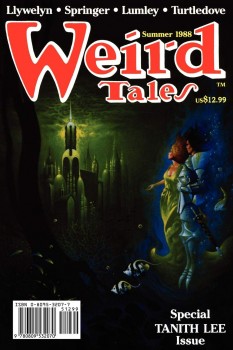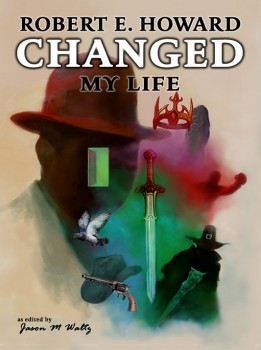Rogue Blades Presents: What Would Your Hero Say to You?
 When I started out as a writer of fiction in the late 1980s, one of my favorite magazines was Weird Tales. Over the next decade or so, I submitted a half dozen stories to Weird Tales, none of which were ever accepted for publication. Still, even though none of my tales ever landed there, I learned a lot from the letters I received from one of the editors, George H. Scithers.
When I started out as a writer of fiction in the late 1980s, one of my favorite magazines was Weird Tales. Over the next decade or so, I submitted a half dozen stories to Weird Tales, none of which were ever accepted for publication. Still, even though none of my tales ever landed there, I learned a lot from the letters I received from one of the editors, George H. Scithers.
Perhaps you’ve heard of Mr. Scithers. If not, surely you’ve heard of some of his work. He was the first editor for Isaac Asimov’s Science Fiction Magazine, for which he won two Hugo awards. He was also editor at Amazing Stories, and of numerous anthologies. At Weird Tales, he won a World Fantasy Award along with Darrell Schweitzer. He was known among writers and readers and editors.
Unfortunately we lost Mr. Scithers a decade ago, but his legacy lives on in the work he produced and in fandom. Many of today’s readers probably don’t even realize how much they owe to this gentleman.
And “gentleman” is not a word I use lightly. I never knew Mr. Scithers personally. He and I never met. I can’t speak to his everyday attitudes and demeanor. Yet he was always kind and supportive in the reply letters he wrote back to me as a budding writer. He always had good things to say while not being afraid to point out where I needed to polish. He could be critical without being overbearing and negative, a trait that seems lost in today’s world. Also, I’ve met with or had correspondence with other people who actually did know or had at least met Mr. Scithers, and every single one of those individuals has had good things to say about George. So I feel my calling him a “gentleman” is most apt, especially as every correspondence I had with him was most friendly and congenial.
I held onto those half dozen letters for decades. I kept them in a thick, heavy folder with other rejection and acceptance letters I had received over the years from other editors. Sad to say, I lost that folder and all those letters to a fire some years ago. It has pained me since, especially to have lost those letters from Mr. Scithers.
See, George Scithers was something of a hero to me. He might not have cared to have been called a “hero,” and I’m not suggesting he was the kind of guy who would have stormed an enemy stronghold, though I do know he served in the U.S. Army in the Korean War. No, Mr. Scithers was more of a personal hero to me, a literary hero, an editorial hero. Not only did his kind and critical words keep me upon my path, but his career within the speculative community did the same. He was someone to watch, someone to pay attention to. No, he wasn’t the most famous of individuals, as few editors are, but fame had never been something I had sought.
Of late, a decade after Mr. Scithers’ passing, I’ve had a lot of reasons to think of him, to think of heroes, even my own personal heroes.
As a writer and editor of fantasy fiction and a reader of all kinds of fiction, I’m often thinking of heroes. As a player of tabletop role playing games, I’m often thinking of heroes. As a board member of Rogue Blades Foundation, a nonprofit publisher focusing on heroic literature, I’m definitely often thinking of heroes. On top of all that, recently something else concerning heroes struck a cord with me.
A few weeks ago author Jason Reynolds, the National Ambassador for Young People’s Literature 2020-2021, released a video in which he challenged young people to write an imagined letter to themselves from one of their personal heroes. Basically, imagine receiving a letter from someone you think of as a hero and imagine what that letter would say. Then write the letter.
I’m talking real-world heroes here, not the fictional sort, though one could write a letter from a fictional hero, too.
Reynolds mentioned various names of people who might be considered heroes by some, but he left it up to the viewer and reader to define for themselves what or who a hero happens to be.
Who would you want to receive a letter from? What would that letter say?
Personally, I mentioned George Scithers above, and I’d love to have back those letters I had from him. But there are others I wouldn’t mind having a letter from, authors such as Robert E. Howard or Alexandre Dumas. More close to home, I’d love to have a letter from my father, who passed away six years ago, or from my friend Coop, who passed three years ago, or my buddy Des, who died last week possibly due to complications of the Coronavirus.
 None of these people ran into a burning building to pull me out. None of them faced down a sword or gun to save my life. None of them jumped into a pool of sharks to rescue me. But some of them threw ball with me, or went fishing with me, or simply entertained me. They spent time with me, and I spent time with them.
None of these people ran into a burning building to pull me out. None of them faced down a sword or gun to save my life. None of them jumped into a pool of sharks to rescue me. But some of them threw ball with me, or went fishing with me, or simply entertained me. They spent time with me, and I spent time with them.
That was enough.
That was enough for each of them to become heroes to me in some fashion or other.
As Jason Reynolds suggested, I could imagine letters to myself from my heroes. I could even potentially write such letters. The contents would be personal, so instead of doing that here, I’ll suggest you think about some of your own heroes. What kind of a letter would they write to you? What would they have to say?
Fortunately, even if we can’t get a personal letter from one of our heroes, sometimes there are letters available though those letters weren’t meant for us in particular. For instance, there are a handful of books available which collect letters to and from Robert E. Howard, as well as web sites which contain some of his letters. And while not exactly letters, essays from a number of well-known authors will appear in Robert E. Howard Changed My Life, coming from Rogue Blades Foundation in 2021, and those articles likely will mimic many of our own thoughts concerning the father of Sword & Sorcery.
Think about it. A letter from one of your heroes. Maybe that hero would be a movie star or a musician, or a writer or a family member. Maybe it would be your neighbor, your boss, your friend, your spouse. Maybe it would be a veteran, a doctor, a nurse, a police officer. Imagine what they would say to you. And imagine … just imagine … what you would say back, because maybe you should be the one writing a letter to someone.
Because just perhaps, you are somebody’s hero.
Ty Johnston is vice president of the  Rogue Blades Foundation, a non-profit organization focused upon bringing heroic literature to all readers. A former newspaper editor, he is the author of several fantasy trilogies and individual novels.
Rogue Blades Foundation, a non-profit organization focused upon bringing heroic literature to all readers. A former newspaper editor, he is the author of several fantasy trilogies and individual novels.
I still have that issue of Weird Tales on my shelf!
Terrific post, Ty; great question. I want another letter from my grandfather. I get a chill even now mentally picturing an envelope with my name in his bold, strong lettering. Thanks for letting me hear his voice again.
Great post, Ty. George Scithers was a hero of mine as well. He wrote gently encouraging rejection letters to the stories I submitted to Asimov’s when I was 12, and just the act of being taken seriously as a writer was all it took to set me on the path to eventual publication.
I did get the chance to meet George, at the 2002 World Fantasy Convention in Minneapolis. We’d published several issues of Black Gate by then, and George was interested in seeing the text of my Writer Guidelines. I handed him a copy rather self-consciously, as they’d been very much inspired by the guidelines he’d sent me two decades ago.
He came to see me the next morning, saying that he liked them quite a bit, and there were bits of text he would like to use in future version of the WEIRD TALES guidelines. It was a wonderful complement, and it meant a great deal to me.
I told my wife as we were driving back from the con that the handwritten rejection letters I gave to every Black Gate submission were my attempts to repay the kindness George had shown me all those years ago. I can’t recall if I told him the same thing. I hope so.
John, glad to see George’s good will lived on through Black Gate.
Funny you talk about those guidelines, because I recall the Weird Tales guidelines being something of a small pamphlet but as helpful and as thorough as any I’ve been before or since.
Great piece! Ty, we must be about the same age, because your timeline follows closely to mine. It was Darrell, not George, who wrote me tons of in-depth rejection letters (as I’ve chronicled elsewhere) over the course of about 15 years. However, he was probably following the example that George set by mentoring HIM years earlier. I think that George set the example of a good editorial mentor for Darrell, and Darrell applied those lessons in mentoring me–and others too, I’m sure. Darrell has a lot of great things to say about George Scithers, and I’ve only heard positive things from other people about George. George and Darrell both knew: A rejection is a learning opportunity, and if you want writers submitting to you to get BETTER, it pays to give them some good advice. Especially when they’ve gone to all the time and trouble of submitting something. We don’t see that kind of mentorship anymore–at least not very many places–and it’s sad. One of a good editor’s jobs is to foster new talent–a lot of editors seem to neglect this part of their duties–and some of them seem to reject the whole idea. I’ve been a professional editor many times in my life , and I know how incredibly busy they can get. Still, it pays to invest in the future generation of talent because that’s the generation that will be keeping your maagazine alive in a few years. This lack of mentoring may be one of the important reasons why we don’t have too many fiction mags out there anymore. I’m just sayin’….
Hi, Ty. Great post! My most influential rejection to one of my early efforts came from George when he was at Amazing Stories. He wrote, “I hope while you were waiting to hear from us on this story that you were working on your next.”
I continued to send him stories for several years, all rejected, but he started to feel like a pen pal. In the cover letter I might mention news I thought he would be interested in, or react to a story he published lately, and he grew increasingly chatty, asking about other writers I might know, or how I was doing in general.
Eventually he started buying my stories, all for Weird Tales. I finally met him at a convention, and he was as supportive and kind as he was in his notes back to me. I’d had a bunch of good story sales in a row when I met him, which I mentioned. He said, “Enjoy it while you can. Publishing is a roller coaster ride.”
Thanks for this article, reminding us of what an important figure he is in the field.